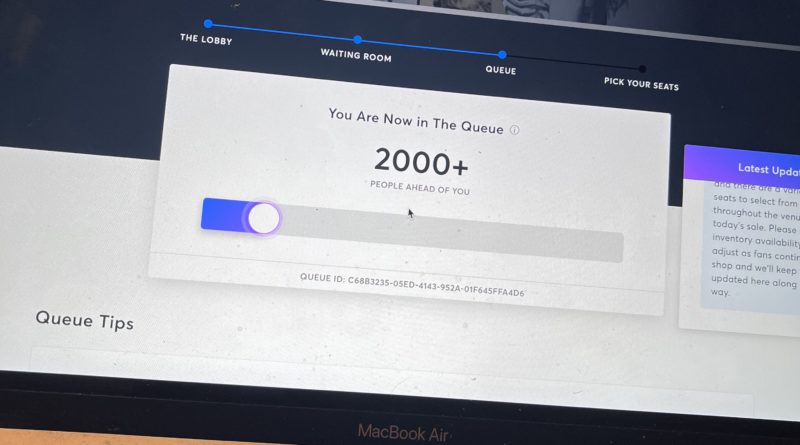OPINION: Ticketmaster’s front row seat to the U.S. Senate
Zoë Hill | Print Editor-in-Chief
A friend of mine recently said to me: “Whenever I hear Taylor Swift, I think of you.”
This— being a Swiftie to my core— is a personality trait I have proudly curated for years. I never miss an opportunity to word vomit how the song playing overhead in Kroger is actually a deepcut toward John Mayer in the wake of his age-gap love affair with Ms. Swift.
A few months ago, my Swiftie loyalty was put to the ultimate test when I went up against the final boss of the entertainment industry: Ticketmaster.
Although I have yet to attend a Taylor Swift tour, I am a huge concert-goer in general. I went to about 10 shows or concerts last year. All this to say, I have gone toe-to-toe with the biggest ticket seller more than I (or my wallet) would have liked to. Of those 10 shows, nine of the artists sold their tickets through Ticketmaster. It is the biggest market, so it’s the clear choice for artists. But for fans, it’s a harrowing choice.
Now, I know there are greater problems in the world; There is always the option to just not buy tickets and stay home, but what fun would that be?
Let me break down my November for you. On Nov. 1, Taylor Swift announced The Eras Tour via social media. This was huge considering her tenth and latest album, “Midnights,” had just come out a week and a half before. Because of the COVID-19 pandemic, this would also be her first tour since 2018. She has released four new albums and released two older albums since her “Reputation” stadium tour.
Taylor Swift’s team and Ticketmaster anticipated incredible demand for tickets to The Eras Tour, and set up a presale selection process, known as Ticketmaster’s Verified Fan program, “to ensure tickets get into the hands of fans.” Fans had nine days to sign up for the program and select which cities they would be interested in buying tickets for. Several days later, Ticketmaster rolled out emails to those who signed up to inform them if they were either selected to receive a presale code for a specific venue and date or waitlisted. Essentially, you were maybe going to be picked to maybe buy tickets.
I was fortunate to get a presale code for June 30 in Cincinnati, but I know many people who didn’t even get that far. My roommate also got a code for the July 1 Cincinnati show.
The public on sale was scheduled for Nov. 18, but the presale was to happen three days before at 10 a.m.
I prepared myself by getting out my credit card, writing my presale code, charging my computer, and logging onto Ticketmaster at 7 a.m. that day. I hopped in the waiting room before being transferred to the now-infamous queue around 9 a.m. When the sale began at 10 a.m., I was prompted with the message “there are 2000+ people ahead of you in the queue.” That was the understatement of the century given that 1.4 million people had logged in to buy tickets.
I sat in the queue awaiting my turn for eight hours. I went to work and class with my computer slightly propped open. I seriously walked across campus while it was snowing with my laptop open, and so did my roommate. Dayton men’s basketball student voucher claim opened at noon that day, and I was told by multiple students that Ticketmaster was struggling to work.
I secured my tickets and paid way over what was advertised as ticket price, mostly from just Ticketmaster fees.
A Capital One cardholder was simultaneously happening, but then it got rescheduled to the next day. Then, it got canceled a short time into the sale. The public sale also got canceled because there weren’t tickets left for sale.
Okay so who cares, right? Congress apparently does.
The Senate held a hearing Tuesday to investigate the Ticketmaster fiasco surrounding the Taylor Swift tour. Live Nation Entertainment, the company that owns Ticketmaster, was accused of being a monopoly, and Joe Berchtold, a Live Nation top executive, was grilled with questions.
“I want to congratulate and thank you for an absolutely stunning achievement,” Senator Richard Blumenthal said to Berthtold. “You have brought together Republicans and Democrats in an absolutely unified cause.”
Berthold blamed an overwhelming number of bots for why sales had to be paused, rescheduled, and even canceled. Thousands of fans missed out on tickets because of these issues.
An earlier explanation from the company also attributed the issues to record-breaking demand, with over 3.5 billion system requests despite only 1.5 million fans receiving codes.
According to Bookies, a sports betting resource, fans had a 2% chance of getting tickets in the general sale before it was ultimately canceled, and a 5% chance through the presale. For comparison, Yale University has a 5.3% acceptance rate, meaning that it is statistically easier to get into Yale than the Eras Tour.
The Senate hearing was curtailed by Congresspersons making cringe-worthy Taylor Swift puns during questioning, but Ticketmaster should be held accountable for their monopoly on the ticketing industry. Watching how this unfolds in front of the United States Senate should be interesting, to say the least, but I hope stronger antitrust laws can come from this.
To quote Blumenthal quoting Taylor Swift: “May I suggest, respectfully, that Ticketmaster ought to look in the mirror and say, ‘I’m the problem. It’s me.’”
Never doubt a Swiftie’s power to bring down the system.
For more opinion pieces, like Flyer News on Facebook and follow us on Twitter (@FlyerNews) and Instagram (@flyernews).

